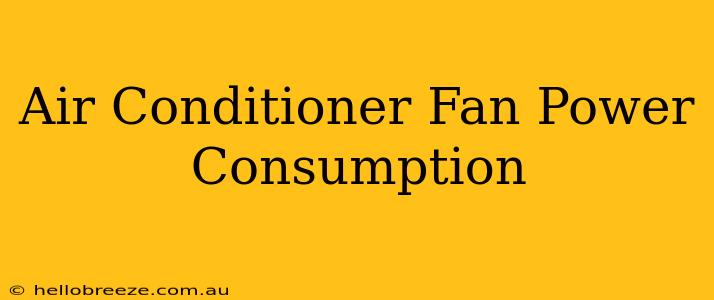Are you concerned about the energy consumption of your air conditioner's fan? Understanding how much power your AC fan uses is crucial for managing energy bills and making informed decisions about your cooling system. This comprehensive guide will delve into the factors affecting air conditioner fan power consumption, offering tips to minimize energy usage and save money.
Understanding AC Fan Power Consumption
The power consumption of your air conditioner's fan varies significantly depending on several key factors:
1. Fan Motor Size and Type
The size of the fan motor directly impacts its power draw. Larger motors, typically found in larger AC units, consume more electricity. The type of motor also plays a role. Older AC units often employ less efficient motors compared to modern, energy-efficient models like DC inverter motors. These newer motors adjust speed more precisely, consuming less energy when less cooling is needed.
2. Fan Speed Settings
The speed at which your AC fan operates directly correlates with its power usage. Running the fan on high speed will naturally consume more electricity than using a lower speed. Utilizing lower fan speeds, especially when the room is already relatively cool, can significantly reduce energy consumption.
3. AC Unit Size and Efficiency
The overall size and efficiency rating of your air conditioner impact the fan's power consumption. A correctly sized unit for your space will work more efficiently, reducing the strain on the fan motor and lowering its energy usage. Check your AC unit's SEER rating (Seasonal Energy Efficiency Ratio); a higher SEER rating indicates greater energy efficiency.
4. Ambient Temperature and Humidity
External temperature and humidity levels affect how hard your AC unit, and therefore the fan, needs to work. On extremely hot and humid days, the fan will run longer and potentially at higher speeds to maintain the desired temperature, resulting in higher energy consumption.
5. Maintenance and Cleanliness
Regular maintenance is crucial for optimal AC performance and energy efficiency. A dirty air filter restricts airflow, forcing the fan motor to work harder and consume more energy. Regular filter cleaning (at least monthly) is essential. Professional maintenance checks should also be performed annually to ensure your system is operating at peak efficiency.
Reducing Air Conditioner Fan Power Consumption
Here are several practical steps you can take to minimize the energy usage of your AC fan:
- Choose Energy-Efficient Models: When purchasing a new AC unit, prioritize models with high SEER ratings and energy-efficient fan motors.
- Use Smart Thermostats: Smart thermostats allow for precise temperature control and can optimize fan operation based on occupancy and usage patterns, saving energy.
- Adjust Fan Speed: Utilize lower fan speeds whenever possible to reduce energy consumption without compromising comfort.
- Regular Maintenance: Clean or replace your air filter regularly and schedule annual professional maintenance checks.
- Improve Home Insulation: Proper insulation reduces the amount of heat entering your home, reducing the workload on your AC unit and its fan.
- Strategic Room Placement: Ensure proper ventilation and airflow around your AC unit.
- Utilize Ceiling Fans: Ceiling fans can help circulate air more efficiently, potentially allowing you to use lower settings on your AC fan.
Conclusion
Understanding the factors affecting air conditioner fan power consumption empowers you to make informed choices regarding your cooling system. By implementing the tips outlined above, you can significantly reduce your energy usage and lower your electricity bills while maintaining comfort levels. Remember, preventative maintenance and smart usage habits can make a substantial difference.

